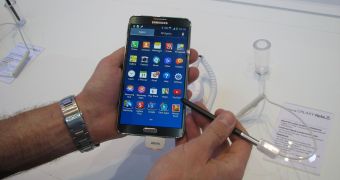Recently, South Korean mobile phone maker Samsung Electronics was found to have tweaked Galaxy Note 3’s software to boost the CPU speeds when a benchmarking app was launched, but the company claims that this was not the case.
In fact, the same as it did when this issue was found on Galaxy S4, Samsung said that the CPU booster was there for any resource-demanding application.
The inclusion of the tweak allows the mobile phone to deliver a smooth experience to its users even when apps that need increased performance capabilities are launched.
"The Galaxy Note 3 maximizes its CPU/GPU frequencies when running features that demand substantial performance," Samsung said in a statement, a recent article on CNET UK reads.
"This was not an attempt to exaggerate particular benchmarking results. We remain committed to providing our customers with the best possible user experience."
However, recent reports actually demonstrated that Galaxy Note 3 was, in fact, capable of recognizing benchmarking apps when launched, and that it increased CPU and GPS frequencies only in such situations.
Furthermore, it was proven that the device would exhibit a different behavior when running a renamed instance of a benchmarking app, as it would not recognize it and would not boost the CPU speed to improve test results.
Code found on the smartphone unveiled that Samsung specifically included a list with the most popular benchmarking apps for Android out there.
Samsung did not cover these aspects in the above statement, as can be seen.
However, it appears that the South Korean vendor is not the only mobile phone maker out there to apply such a strategy when it comes to ensuring high scores in benchmarks.
Clearly, the results of such tests are only one aspect related to the performance capabilities of a smartphone, as devices behave differently when it comes to everyday, heavy usage.
Even so, I do believe that it would be nice to know that vendors are actually fair and square when it comes to the aforementioned benchmarking results.

 14 DAY TRIAL //
14 DAY TRIAL //